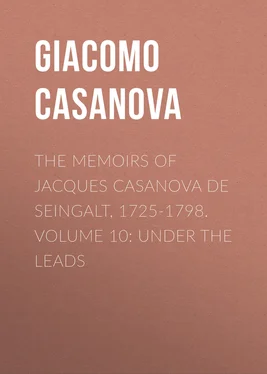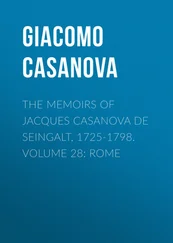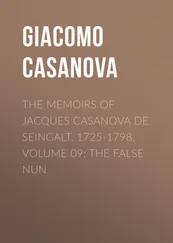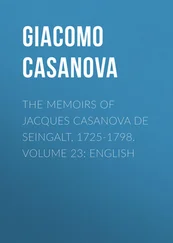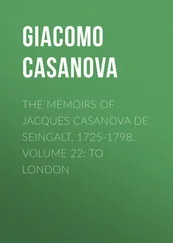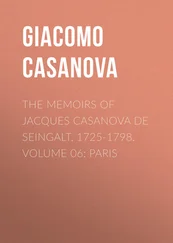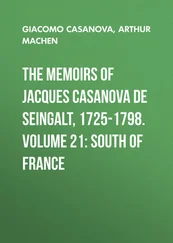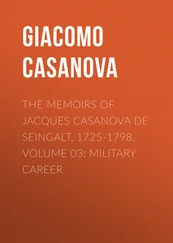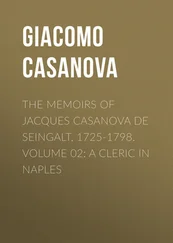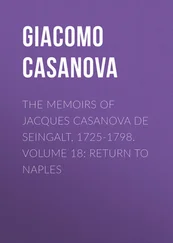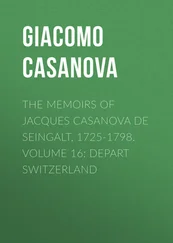Giacomo Casanova - The Memoirs of Jacques Casanova de Seingalt, 1725-1798. Volume 10 - under the Leads
Здесь есть возможность читать онлайн «Giacomo Casanova - The Memoirs of Jacques Casanova de Seingalt, 1725-1798. Volume 10 - under the Leads» — ознакомительный отрывок электронной книги совершенно бесплатно, а после прочтения отрывка купить полную версию. В некоторых случаях можно слушать аудио, скачать через торрент в формате fb2 и присутствует краткое содержание. Жанр: Биографии и Мемуары, История, foreign_edu, foreign_antique, foreign_prose, на английском языке. Описание произведения, (предисловие) а так же отзывы посетителей доступны на портале библиотеки ЛибКат.
- Название:The Memoirs of Jacques Casanova de Seingalt, 1725-1798. Volume 10: under the Leads
- Автор:
- Жанр:
- Год:неизвестен
- ISBN:нет данных
- Рейтинг книги:4 / 5. Голосов: 1
-
Избранное:Добавить в избранное
- Отзывы:
-
Ваша оценка:
- 80
- 1
- 2
- 3
- 4
- 5
The Memoirs of Jacques Casanova de Seingalt, 1725-1798. Volume 10: under the Leads: краткое содержание, описание и аннотация
Предлагаем к чтению аннотацию, описание, краткое содержание или предисловие (зависит от того, что написал сам автор книги «The Memoirs of Jacques Casanova de Seingalt, 1725-1798. Volume 10: under the Leads»). Если вы не нашли необходимую информацию о книге — напишите в комментариях, мы постараемся отыскать её.
The Memoirs of Jacques Casanova de Seingalt, 1725-1798. Volume 10: under the Leads — читать онлайн ознакомительный отрывок
Ниже представлен текст книги, разбитый по страницам. Система сохранения места последней прочитанной страницы, позволяет с удобством читать онлайн бесплатно книгу «The Memoirs of Jacques Casanova de Seingalt, 1725-1798. Volume 10: under the Leads», без необходимости каждый раз заново искать на чём Вы остановились. Поставьте закладку, и сможете в любой момент перейти на страницу, на которой закончили чтение.
Интервал:
Закладка:
To a certain extent I was acquainted with the ways of the Colossus which was crushing me under foot, but there are things on earth which one can only truly understand by experience. If amongst my readers there are any who think such laws unjust, I forgive them, as I know they have a strong likeness to injustice; but let me tell them that they are also necessary, as a tribunal like the Venetian could not subsist without them. Those who maintain these laws in full vigour are senators, chosen from amongst the fittest for that office, and with a reputation for honour and virtue.
The last day of September I passed a sleepless night, and was on thorns to see the dawn appear, so sure was I that that day would make me free. The reign of those villains who had made me a captive drew to a close; but the dawn appeared, Lawrence came as usual, and told me nothing new. For five or six days I hovered between rage and despair, and then I imagined that for some reasons which to me were unfathomable they had decided to keep me prisoner for the remainder of my days. This awful idea only made me laugh, for I knew that it was in my power to remain a slave for no long time, but only till I should take it into my own hands to break my prison. I knew that I should escape or die: 'Deliberata morte ferocior'.
In the beginning of November I seriously formed the plan of forcibly escaping from a place where I was forcibly kept. I began to rack my brains to find a way of carrying the idea into execution, and I conceived a hundred schemes, each one bolder than the other, but a new plan always made me give up the one I was on the point of accepting.
While I was immersed in this toilsome sea of thought, an event happened which brought home to me the sad state of mind I was in.
I was standing up in the garret looking towards the top, and my glance fell on the great beam, not shaking but turning on its right side, and then, by slow and interrupted movement in the opposite direction, turning again and replacing itself in its original position. As I lost my balance at the same time, I knew it was the shock of an earthquake. Lawrence and the guards, who just then came out of my room, said that they too, had felt the earth tremble. In such despair was I that this incident made me feel a joy which I kept to myself, saying nothing. Four or five seconds after the same movement occurred, and I could not refrain from saying,
"Another, O my God! but stronger."
The guards, terrified with what they thought the impious ravings of a desperate madman, fled in horror.
After they were gone, as I was pondering the matter over, I found that I looked upon the overthrow of the Doge's palace as one of the events which might lead to liberty; the mighty pile, as it fell, might throw me safe and sound, and consequently free, on St. Mark's Place, or at the worst it could only crush me beneath its ruins. Situated as I was, liberty reckons for all, and life for nothing, or rather for very little. Thus in the depths of my soul I began to grow mad.
This earthquake shock was the result of those which at the same time destroyed Lisbon.
CHAPTER XXVII
Various Adventures—My Companions—I Prepare to Escape—Change of Cell
To make the reader understand how I managed to escape from a place like the Leads, I must explain the nature of the locality.
The Leads, used for the confinement of state prisoners, are in fact the lofts of the ducal palace, and take their name from the large plates of lead with which the roof is covered. One can only reach them through the gates of the palace, the prison buildings, or by the bridge of which I have spoken called the Bridge of Sighs. It is impossible to reach the cells without passing through the hall where the State Inquisitors hold their meetings, and their secretary has the sole charge of the key, which he only gives to the gaoler for a short time in the early morning whilst he is attending to the prisoners. This is done at day-break, because otherwise the guards as they came and went would be in the way of those who have to do with the Council of Ten, as the Council meets every day in a hall called The Bussola, which the guards have to cross every time they go to the Leads.
The prisons are under the roof on two sides of the palace; three to the west (mine being among the number) and four to the east. On the west the roof looks into the court of the palace, and on the east straight on to the canal called Rio di Palazzo. On this side the cells are well lighted, and one can stand up straight, which is not the case in the prison where I was, which was distinguished by the name of 'Trave', on account of the enormous beam which deprived me of light. The floor of my cell was directly over the ceiling of the Inquisitors' hall, where they commonly met only at night after the sitting of the Council of Ten of which the whole three are members.
As I knew my ground and the habits of the Inquisitors perfectly well, the only way to escape—the only way at least which I deemed likely to succeed—was to make a hole in the floor of my cell; but to do this tools must be obtained—a difficult task in a place where all communication with the outside world was forbidden, where neither letters nor visits were allowed. To bribe a guard a good deal of money would be necessary, and I had none. And supposing that the gaoler and his two guards allowed themselves to be strangled—for my hands were my only weapons—there was always a third guard on duty at the door of the passage, which he locked and would not open till his fellow who wished to pass through gave him the password. In spite of all these difficulties my only thought was how to escape, and as Boethius gave me no hints on this point I read him no more, and as I was certain that the difficulty was only to be solved by stress of thinking I centered all my thoughts on this one object.
It has always been my opinion that when a man sets himself determinedly to do something, and thinks of nought but his design, he must succeed despite all difficulties in his path: such an one may make himself Pope or Grand Vizier, he may overturn an ancient line of kings—provided that he knows how to seize on his opportunity, and be a man of wit and pertinacity. To succeed one must count on being fortunate and despise all ill success, but it is a most difficult operation.
Towards the middle of November, Lawrence told me that Messer-Grande had a prisoner in his hands whom the new secretary, Businello, had ordered to be placed in the worst cell, and who consequently was going to share mine. He told me that on the secretary's reminding him that I looked upon it as a favour to be left alone, he answered that I had grown wiser in the four months of my imprisonment. I was not sorry to hear the news or that there was a new secretary. This M. Pierre Businello was a worthy man whom I knew at Paris. He afterwards went to London as ambassador of the Republic.
In the afternoon I heard the noise of the bolts, and presently Lawrence and two guards entered leading in a young man who was weeping bitterly; and after taking off his handcuffs they shut him up with me, and went out without saying a word. I was lying on my bed, and he could not see me. I was amused at his astonishment. Being, fortunately for himself, seven or eight inches shorter than I, he was able to stand upright, and he began to inspect my arm-chair, which he doubtless thought was meant for his own use. Glancing at the ledge above the grating he saw Boethius, took it up, opened it, and put it down with a kind of passion, probably because being in Latin it was of no use to him. Continuing his inspection of the cell he went to the left, and groping about was much surprised to find clothes. He approached the recess, and stretching out his hand he touched me, and immediately begged my pardon in a respectful manner. I asked him to sit down and we were friends.
Читать дальшеИнтервал:
Закладка:
Похожие книги на «The Memoirs of Jacques Casanova de Seingalt, 1725-1798. Volume 10: under the Leads»
Представляем Вашему вниманию похожие книги на «The Memoirs of Jacques Casanova de Seingalt, 1725-1798. Volume 10: under the Leads» списком для выбора. Мы отобрали схожую по названию и смыслу литературу в надежде предоставить читателям больше вариантов отыскать новые, интересные, ещё непрочитанные произведения.
Обсуждение, отзывы о книге «The Memoirs of Jacques Casanova de Seingalt, 1725-1798. Volume 10: under the Leads» и просто собственные мнения читателей. Оставьте ваши комментарии, напишите, что Вы думаете о произведении, его смысле или главных героях. Укажите что конкретно понравилось, а что нет, и почему Вы так считаете.
